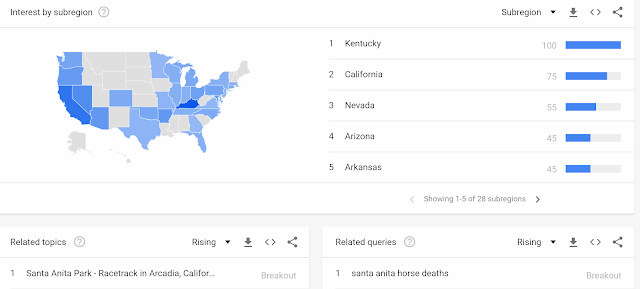Last week
Rob Pizzola did his yearly NHL playoff periscope, and one of the series he first looked at was Tampa-Columbus. He liked the dog; not because they were more likely to win, but because the odds were, he thought, too juicy on the dog.
After getting a few messages about how dumb he was to "like the dog" against the mighty Lightning, he simply said, 'if you don't understand I'm betting Columbus not because I think they're more likely to win, but because if I bet them 1,000 times I think I'd make money, you're on the wrong periscope.'
The dog is doing quite well, and could possibly be up 3-0 tonight. Even if they were losing 3-0, however, it was probably a good bet. Tampa was just way too big a favorite.
Liking someone, versus liking to bet someone, or some team, is always a bit of a mind-bender for the non-betting public.
Today, Tiger Woods won the Masters. The major media and casual fans are focusing on his win from a narrative perspective and that's understandable, but to bettors, this win isn't super-surprising.
Before the tournament started, Tiger had about a 3%, or 4% chance to win - it's a short field, he has course knowledge, and he's been playing well. Golfers each and every week win tournaments who start the week with a 3% chance; this is simply another of those. If you took under 25-1 on Woods, you probably made a bad bet, but congrats. It's nice to cash.
What was surprising to me, however - and I could not really get my head around it - was the Saturday night price on Tiger. His approximate +300 price felt just plain off.
But, when we think of it, we've seen this for a long time haven't we? For the last 40 Majors Tiger Woods' price has been off, and betting against him has been a cottage industry. He's always overbet (and he'll be even more overbet for next month's PGA at Bethpage).
Looking back, you know who else was overbet?
Jack Nicklaus, in what's considered the greatest Masters of all time in 1986 (I still vividly remember it; yep, I watched the Masters when I was in high school), came into the tournament with some calling him the "Olden Bear". He wasn't overly serious about golf any longer, and his first couple of rounds of 74 and 71 didn't make too many think. After shooting 69 on moving day, though, he was sitting in a tie for 9th, four shots off the lead. But it was with a stacked leaderboard that included Tom Kite, Greg Norman and Seve.
Before he started his round on Sunday, Jack's odds were, what, +800? +1000?
No, I've read he was offered out at +300. That number was worse than Tiger's - he was only a couple off, tied with Tony Finau who has never won anything of merit. It truly was a bizarre number.
We all know what happened. Jack shot 65, with a six under back nine to take home his 6th Jacket. The +333 folks were pure golden (Bear).
Over the years I've noticed a lot of bets like this in golf; bets that don't really make a lot of sense.
I remember one of my betting friends playing the Els Open way back when on Betfair. Ernie had a little two and a half foot curler to win, and there was tens of thousands offered out at 1.01. He took a pile of it and lost - Ernie made it - but that was a good bet. There's no way Ernie makes that 98 or 99% of the time.
Golf is a hell of a fun sport to bet, but it's a bet just like any bet - there's a probability of something happening, and a resulting price. When it comes to the stars of the sport - in 1986 or 2019 - I think there's still some meat on the bone.
Golf TV for Bettors has Aways to Go
For the non-betting public, we saw the probability angle bastardized in its own special way today.
Brooks Koepka was the only guy who could catch Tiger, and CBS stuck with a camera on Tiger putting on his lip balm on the 17 tee while Brooks was taking his approach. BK drilled it to around ten feet and probably had about a 10%-12% chance to be only one back (if Brooks could putt average, which as you all saw, wasn't the case this weekend). With 18 playing tough, the tournament was far from over. You'd never have known it watching the teevee. They were convinced the winner was settled. If golf TV wants to talk to the golf betting public, they have a ways to go. Maybe they need to hire a geeky analytics person.







